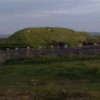Great news for fans of the Vikings -- not the football team, but the actual Norse pillaging-explorer variety of a millennium ago. Newfoundland may be home to a second Viking settlement!
Researchers have found evidence suggesting that another Viking site is located at Point Rosee on the southwest coast of Newfoundland. The first site, L'Anse aux Meadows, is near the northern-most tip of Newfoundland some 600 kilometers away. L'Anse aux Meadows has been restored and currently is the only authenticated Norse settlement in North America. Parks Canada operates it as a National Historic Site.
Archeologist Sarah Parcak and her team are digging in Point Rosee looking for evidence of Norse artifacts in the area. They are said to have found Viking-like walls and bog iron, both suggestive of a settlement. More evidence is needed before the site is considered conclusive for Norse habitation. A PBS documentary scheduled for this Wednesday outlines the search, including how high-power satellite imagery was used to find potential Viking sites in Newfoundland.
Vikings were the first Europeans to build settlements in Newfoundland and Labrador. The thousand-year-old L'Anse aux Meadows settlement was discovered in the 1960s. Archeologists have suggested that Vikings used their L'Anse aux Meadows as a "base camp for expeditions further south." This type of exploration is certainly in keeping with the Viking character. It is not know why or how long ago the Vikings abandoned their settlement in Newfoundland.
More on this story at this link.
Photo © CBC. The L'Anse aux Meadows site on the northern peninsula of Newfoundland.


Comments (3)